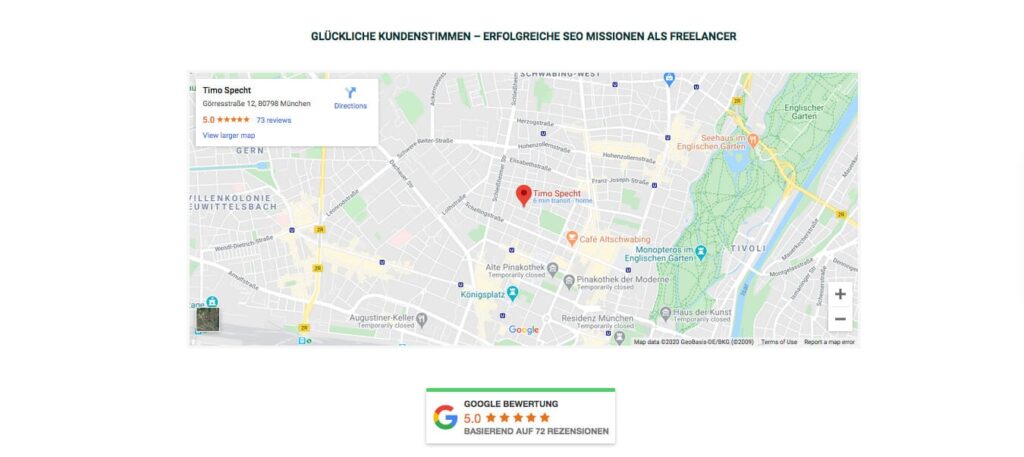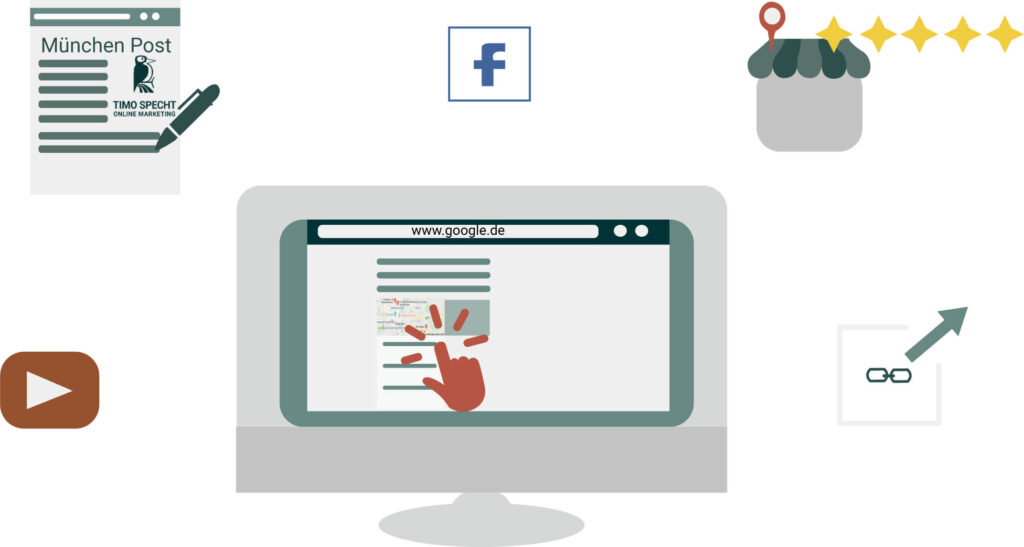Why different rules apply to Local SEO
You probably know the SEO SUCCESS LAWS and SEO basics from my previous posts. Of course, these also apply to local search. However, local SEO is a small science in itself.

Did you know that...
... a large part of the search queries can lead to very different results - depending on where the searcher is at the moment?
... pages without local optimization have little chance of landing in the directly visible area of the results for search queries with a local reference?
... 89% of all people make a search query at least once a week to find a local business?
Reason enough to look into the Local SEO ranking factors that will skyrocket your chances of a good ranking.
By the way, rankings in the front area are particularly relevant in local search, because on mobile devices, users often only see the top area - and most local searches are made on the go.
New trends such as voice search ("Okay, Google! Show me restaurants near me!") could also make top rankings even more important.
Note
I'm not going to go into the absolute SEO basics, but rather explain what is particularly important in terms of local search engine optimization. You can read about the basics in this article.
-
Free
SEO strategy meeting
In a free SEO strategy talk, we uncover untapped potential and develop a strategy to help you become more successful on Google.

- More organic visibility
- More organic visitors to your website
- More inquiries & sales
Factor #1: Visual reference of the website
In order to achieve a good ranking for local search queries (e.g. "locksmith Hamburg"), Google must first understand that you are really relevant for this region.
The following measures can help:
- Create structured data (address, phone number, opening hours, etc.). Here e.g. schema.org can help. The location should also be integrated into the META specifications.
- Integrate a map on the page, integrate the address in the footer, etc.
- Highlight regional relevance via appropriate content (e.g. blog articles on events that are related to your city)
- Create GOOGLE MYBUSINESS REGISTRATION: Absolutely mandatory for anyone who wants to be played out in Google local search. By the way, I have already uploaded an article about this.

Conclusion on the local relevance of the website
The local relevance of your website must be clearly emphasized. Otherwise Google will ignore you for regional search queries.
Factor #2 Boost local power
In the second step, you need to show Google that you are not only relevant to a particular region, but that your site deserves a place at the top of the rankings.
This is how you can increase your LOCAL SEO power:
- Generate local citations and regionally relevant BACKLINKS (e.g. entries in business directories, profiles on Yelp, Tripadvisor & Co, mentions on local news sites, etc.).
- Generate reviews on Google MyBusiness and other review sites as well as on social networks (especially Facebook). Caution! You should always respond directly to negative reviews and start an open dialog with the critic.
- Generate social signals. Post to social networks, upload videos to YouTube and strengthen the importance of your brand.

Conclusion on local power boosting
This is where the wheat is separated from the chaff. Google needs to recognize that you are not just local, but actually worth a visit. Google MyBusiness reviews in particular seem to be playing an increasingly important role. And that's no wonder - after all, Google wants to get more and more entrepreneurs to create such a listing.
- I am one of the leading SEO experts in Germany
I am known from big media such as Stern, GoDaddy, Onpulson & breakfast television and have already worked with over 100+ well-known clients successful on Google.
Google rating
Based on 185 reviews
Trustpilot rating
Based on 100 reviews
Factor #3 Improve user experience
So far, you have done the duty so that Google classifies your page as relevant and worth showing. In order to really conquer the top places in the ranking, you also have to work hard on the user experience.
This is how you create a good user experience:
- Ensure low abandonment rates on your website. With a well thought-out internal linking, you can achieve more page views per session. For this, however, it is necessary to have sufficient - preferably regionally relevant - content in stock.
- Optimize your Google MyBusiness listing with images, videos and informative posts. Also, make sure that all data is correct (e.g. phone number and opening hours). You should also use the Questions & Answers section to provide more information for your potential customers. You can also enter ready-made questions and answers here.
- Offer the right solution! Google has the claim to present the searcher the best websites that match his search query. Make sure that you fulfill exactly this requirement with your website. If you own a restaurant, for example, a reservation tool on your site is mandatory.
Conclusion on improving the user experience
Improving the user experience is certainly the most difficult part, as you first have to get to know the behavior of your target group. However, with Google Analytics or the statistics from the Google MyBusiness area, you can already assess quite well whether you are on the right track.
- Do you know my SEO newsletter?
Register now and receive regular tips from the experts.

